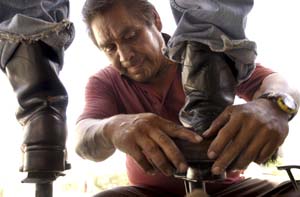
Camilo Rios, 62, is one of the oldest vendors working at the Dennis DeConcini Port of Entry. "You have to be good at managing yourself to support yourself in this business," he says.
Mexico's jobless woes
Tucson, Arizona Monday, 1 September 2003
Chris Richards / Staff
 Camilo Rios, 62, is one of the oldest vendors working at the Dennis DeConcini Port of Entry. "You have to be good at managing yourself to support yourself in this business," he says. |
 Photos by Chris Richards / Staff Mexico's high jobless rate can make self-employment the only option. Shoeshine man Jose Roman Perez says some days he makes money, and some days he doesn't. |
|
By Ignacio Ibarra
ARIZONA DAILY STAR
NOGALES, Sonora - With unemployment in Mexico at the highest level in nearly
five years, jobless Mexicans are being urged to make their own work.
Mexican workers should not expect short-term solutions and instead should look to ways of employing themselves by participating in the nation's "informal economy," Carlos Abascal, Mexico's secretary of labor, said in July.
Unemployment then was at the highest level since 1999.
That informal economy includes small neighborhood markets, in-home cottage
industries and those who hit the streets to sell everything from tacos, tamales
and hot dogs to velvet paintings, purses and compact discs.
The number of people who need work is high.
In Sonora, thousands of positions were lost in recent years, primarily in the
manufacturing and industrial job markets, according to the Mexican Institute
for Social Security. The most seriously affected have been women, who most often
staffed Mexico's foreign-owned maquiladoras.
Once the engine of economic prosperity in the border region, the maquiladora
industry has lost more than 100,000 jobs, nearly 15,000 of those in Nogales,
in the three years since President Vicente Fox took office.
Fox's critics say the notion that the nation's more than 1.6 million unemployed
should be content to sell tamales and burritos, or shine shoes on the streets,
is bad policy.
It could destabilize established retail businesses and result in even more
unemployment.
"Most people don't have the knowledge or skills needed to be successfully
self-employed," said Pedro Peralta, a salesman at El Mirage, a curio shop
near the port of entry in downtown Nogales. "It's disgraceful that the
secretary of labor would suggest this. . . .
"The government should be doing more to create jobs, encouraging investment
and development in technology, looking for new markets and promoting the economy
both internally and externally," Peralta said.
Not far away, Camilo Rios agreed. At 62, Rios is one of the oldest vendors
hawking wares to people waiting in their cars to cross the border at the Dennis
DeConcini Port of Entry each day.
"You have to be good at managing yourself to support yourself in this
business," he said. "The sun shines the same for all of us, and we
all have the same right to survive.
"But they'd have to find a place in some other part of town, because there
are already a lot of us here, and to suddenly have more competition would not
be good," Rios said.
More than 800 licensed street vendors work in Nogales, said Francisco Ocampo,
coordinator for the city's office of inspection and enforcement. Up to 5,000
people - mostly relatives of the permit holders - are supported by the street
sales of food, toys, candy and crafts to tourists and local residents.
The market for street vendors is so saturated in Nogales, particularly in the
commercial district downtown near the port of entry, that new permits are rarely
approved.
"We have a high demand for permits," Ocampo said. "We get about
80 permit applications per month. Only five or six are approved."
Illegal vendors, or piratas , are cited in various parts of the city by Ocampo's
15-member enforcement staff.
Making such small businesses succeed is difficult, Ocampo said, and within two
or three months, many of the startups call it quits "because their businesses
are simply not viable. Most of them complain of poor sales."
Improving the success rate for startup efforts is the goal of the Foundation
for Child Assistance, known as the FAI. The organization works with the city
of Nogales, the Office for Women's Affairs and the federal Secretariat for Economy
to provide consultation, training and even small loans to encourage women and
men to go into business for themselves, said Delia Martin Triana, the FAI's
director in Nogales.
The national organization opened its Nogales offices in January and has already
helped organize three groups totaling about 40 new entrepreneurs.
Within the month, it expects to double that number as more people - mostly
women - turn to self-employment in the economic downturn.
"With the loss of jobs in the maquilas industry, unemployment has become
a huge problem, especially for women and for older people," Martin said.
"We're working with groups of five to 15 people who work from their homes
making tortillas, chorizo and other products that they can sell in their neighborhoods
and on the streets.
"Our program gives them hope, and the training and financial assistance
they need to succeed . . . so they can get beyond eating their profits just
to survive."
Maria Felipa Gomez, or Doña Elena, is one of the stars of the FAI's
program in Nogales.
Gomez has parlayed a family recipe for pickled jalapeño peppers into
a cottage industry, churning out more than 20 mason jars of chile curtido each
week.
The $2 jars of pickled peppers are sold to neighbors and to other FAI members
who operate carts around the city hawking hot dogs, tacos and other foods.
Gomez, a 67-year-old grandmother who raised 13 children of her own and two
grandchildren, said she had always worked from her home as a seamstress.
She made clothes for family members and neighbors to bring in a little extra
cash for her family.
She started contemplating going into the chile business when her husband died
three years ago.
"I'd always given them away, but I started selling them after my husband's
death," she said. She started the business in January with the help of
the FAI.
Like all other FAI members, Gomez had to come up with a $30 savings account
to start in the program, which allowed her to use the savings to borrow up to
$100 at a time to pay for materials and supplies.
The program rewards success by increasing the businessperson's credit line
as his or her savings grow.
In the eight months since Gomez began her business, her savings account has
more than tripled, and she is now able to borrow up to $400 at a time.
"I was a housewife all of my life, so don't know what I'd be doing without
FAI's help. They've provided me with knowledge and ability and the satisfaction
of doing something for myself.
"My curtido is becoming well known, and I feel my business will continue
to grow and be more profitable."
* Contact reporter Ignacio Ibarra at 806-7746 or at ignacioi@prodigy.net.mx
.